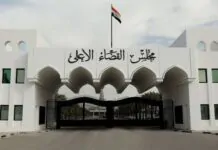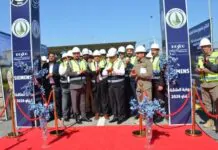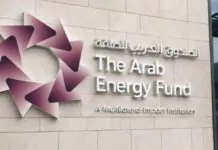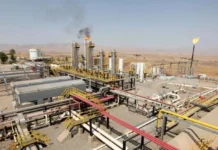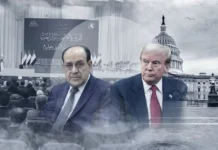Tishwash: Rafidain: Our agreement with K2 Integrity puts Iraq on the map of the global financial system.
Rafidain Bank’s General Manager, Ali Karim Al-Fatlawi, emphasized that signing the partnership agreement with K2 Integrity represents a qualitative shift in the bank’s journey and the Iraqi financial sector. He noted that this strategic step transforms Rafidain Bank from a traditional local institution to an integrated banking platform directly aligned with international standards.
Al-Fatlawi explained, in an interview with the Iraqi News Agency (INA), that the partnership comes with direct support from Prime Minister Mohammed Shia al-Sudani, and in accordance with Cabinet Resolution No. (23274) of 2023, within the framework of a comprehensive reform vision aimed at restructuring the banking sector, strengthening Iraq’s economic and financial sovereignty, and repositioning the country on the map of the international financial system with confidence and transparency.
Al-Fatlawi told (INA): “The partnership agreement with K2 Integrity represents a qualitative shift for Rafidain Bank, which is no longer just a traditional local bank, but has become an institution working to connect Iraq to international banking standards.”
He added, “K2 Integrity is a global leader in compliance and anti-money laundering and counter-terrorism financing, and our collaboration sends a clear message that Iraq is serious about reforming its financial institutions and preparing them to open up to the global financial system.”
Prime Minister’s support He continued, “This partnership would not have seen the light of day without the great support of Prime Minister Mohammed Shia Al-Sudani, who adopted a serious reform vision to restructure the banking sector. The contract with K2 Integrity came in accordance with Cabinet Resolution No. (23274) of 2023, which reflects that this project is not just an individual initiative of the bank, but rather part of a higher government policy aimed at enhancing transparency and financial sovereignty in Iraq.”
Direct gains for citizens
Al-Fatlawi told (INA): “On the local level, this agreement raises the level of compliance and transparency within the bank, and establishes a modern corporate culture based on governance and risk management. As for the citizen, it means more secure banking services, greater protection for their money, and enhanced confidence in an institution that has long been a fundamental pillar of the national economy. Simply put, the citizen will feel that their money is in safe hands subject to global regulatory standards.”
Reintegrating Iraq into the international financial system
Regarding the agreement’s implications for Iraq’s financial reputation, he explained, “Iraq needs to rebuild trust with international institutions, and this agreement is key to that. Through K2 Integrity’s services, we will be able to issue reports according to the highest international standards, which will put us back on the map of the international financial system and give us the ability to open up to global correspondent banks and attract foreign investment. Simply put, we are establishing a new phase in which Iraq is viewed as a country serious about reform, not as a fragile or isolated economy.”
Fortifying the economy
Al-Fatlawi emphasized that “the banking sector is the first line of defense for any country’s sovereignty. Through this partnership, we are not only improving our services, but also protecting our economy from the risks associated with financial isolation or unjustified accusations, and building institutional capacity that grants us greater independence.
This step truly translates the vision of the Prime Minister and the Iraqi government for Rafidain Bank to be part of a broader national project to enhance economic sovereignty.”
Regarding Rafidain Bank’s future vision after this partnership, Al-Fatlawi told the Iraqi News Agency (INA): “This agreement reflects our ambition to transform into a modern, integrated banking institution, capable of keeping pace with technological and regulatory developments in the world.
We are establishing a brighter and more stable banking future, where citizens trust our ability to manage their money, and international institutions trust our ability to comply with global standards. Simply put, we are laying the foundation for an Iraqi bank with a global identity.” link
************
Tishwash: The Baghdad International Energy Forum: A platform to strengthen Iraq’s position in global energy markets
The Baghdad International Energy Forum will kick off in the capital, Baghdad, on September 6 and 7, 2025. Organized by the Ghadan Risk Management Foundation, the forum will be inaugurated by Prime Minister Mohammed Shia al-Sudani, with the broad participation of senior executives from global energy companies, energy ministers, the OPEC President, and international experts.
The event reflects the international community’s confidence in Iraq’s capabilities and its pivotal role in this vital sector.
The forum aims to highlight Iraq’s significant potential in the oil, gas, and renewable energy sectors, as a key partner in meeting global market needs and a supporter of international efforts to achieve sustainability.
The forum will be attended by energy ministers from the region and around the world, as well as global energy companies including TotalEnergies, Oman’s OQ, BP, Chevron, Eni, and Shell. Its sessions will address energy security, market stability, and the transition to clean energy sources.
The forum is organized under the auspices of the State Oil Marketing Organization (SOMO) and in partnership with the Iraqi Ministry of Oil. It serves as an international platform for dialogue and exchange of views on the future of energy in Iraq and the region, and for exploring promising investment opportunities in this strategic sector. link
**************
Tishwash: Iraq faces US banking guardianship… two crucial weeks for private banks
Al-Mustaqilla/- Less than two weeks remain for private banks in Iraq to comply with the financial reform roadmap developed by the American firm Oliver Wyman, a move described by economic circles as the “last chance” to save the banking system from the specter of liquidation and bankruptcy.
According to informed banking sources, the Central Bank of Iraq has two options:
Forcing banks to increase their capital and merge those unable to expand their financial portfolios.
Liquidating violating banks, which opens the door wide to direct intervention by the US Federal Reserve to implement international standards in the Iraqi banking sector.
The risk of liquidation and “financial guardianship”
The second scenario is viewed with great concern within Baghdad, as it effectively imposes a form of American tutelage over the Iraqi banking sector, a precedent that could threaten Baghdad’s financial independence and undermine public confidence in the banking system as a whole.
Experts believe that the US Federal Reserve’s involvement could completely redraw the banking landscape in Iraq, from foreign exchange mechanisms to banks’ ability to finance local projects.
Reform roadmap or political pressure?
Oliver Wyman’s reform roadmap came in response to mounting US pressure, following increasing reports of financial transaction irregularities and accusations that some banks were involved in money laundering or illicit financing.
At the same time, the Iraqi government is seeking to strike a balance between meeting international demands and maintaining economic sovereignty, particularly since any direct foreign intervention would place Iraq in a position of weakness vis-à-vis its international partners.
The countdown has begun
The coming weeks will be crucial. Either the Central Bank of Iraq succeeds in imposing radical reforms that preserve the independence of financial decision-making, or it will find itself forced to accept American intervention, which could be read internally as a “declaration of failure” for the local banking system. link


